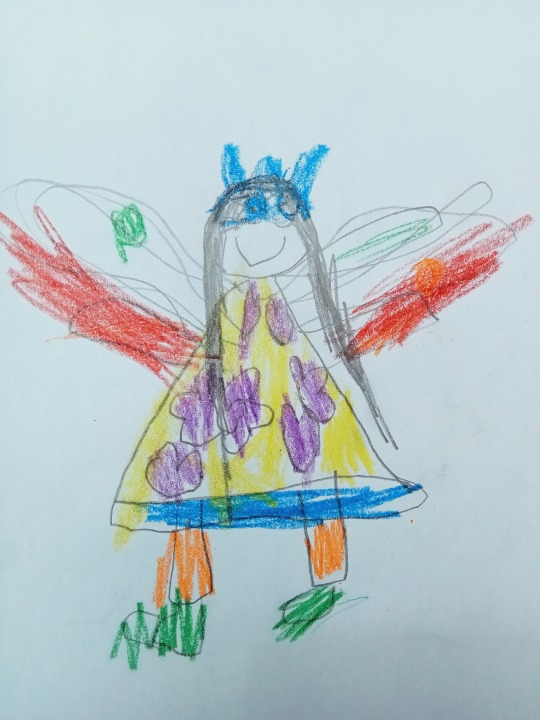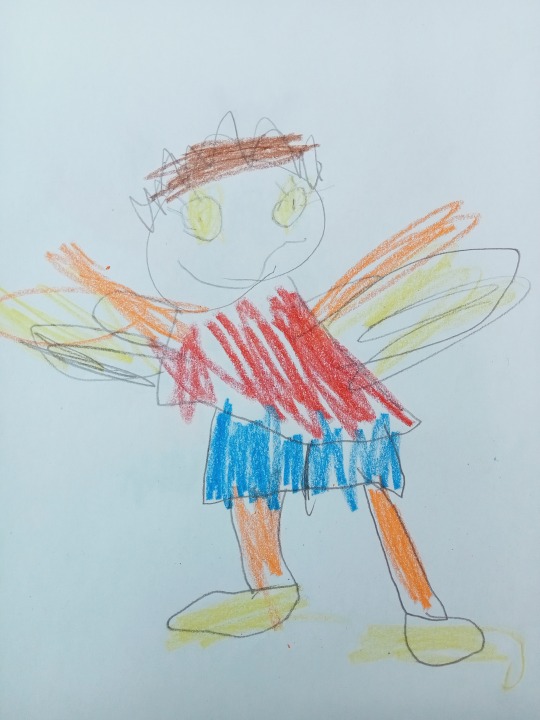
The Fairy of Beauty, by Tenar McDermott
Whilst Jubilees and jubilation are on the UK’s official agenda as the month begins, whilst honours are announced and cheering is expected, I am feeling down. I feel it in my chest – a dull, blunt weight. I don’t believe, when I think of the many present troubles in the world, that I have any right to this feeling. I can identify a few reasons for it, but they seem either absurdly trivial, or even that they should be cause for celebration, not depression. Here they are:
-The children and I have made it to the end of all seven Harry Potter books.
-My son will soon have made it to the end of his time at his present school.
-Twenty-five rejections and one offer later, I have a potential book deal for my novel.
I should be feeling elated. Grateful.
I can do the gratitude, but the elation eludes me.
The frightened tension and fierce exhilaration involved in the act of letting go are over (see last month’s blog). Four years ago we moved to this house so that my son could attend the Steiner school near here and so that I could write my novel. These things are done. We finished Harry Potter – the magic is over. This chapter of our lives is ending. And yet things have a habit of carrying on – a well-known difficulty when grappling with any kind of grief. The clocks don’t stop.
I think I know what this is.
Post-creative depression.
I didn’t suffer from post-natal depression. But I might have. I felt it near. Months of waiting for this moment, and now here it was – I had a baby – and it was hard. I was meant to be happy, and yet I mainly felt exhausted, anxious, lost and leaky. Everything was leaking – eyes, breasts, womb, sense of self. I, my body, had done a phenomenal thing – grown a whole person, birthed them over a five-day labour- but it turned out that making a life wasn’t the main event after all. Now I had to care for it. Now I had to be a responsible, capable adult day and night. Now I had to be mum.
And being mum came with, still comes with, mixed cultural messages. As they grow older my children by turns revere me, insult me or ignore me. This is fine – they’re kids – what is less fine is that this range of responses pretty much sums up how the wider world responds to mothers too. We are deified, dismissed, or judged. As a new mother I remember experiencing all of these attitudes on a regular basis, just on a trip to the shops. With my baby in my sling, I clocked the looks, the dewy-eyed ones, the frowning ones, as well as the lack of looks – had anyone any idea how much I had already been through to get us out the door? No. Evidently not. Small wonder then, that more than one in ten women suffer from post-natal depression.
It was writing that saved me from PND – having a creative practice, that I could access in the dead of night. And also Mothers Who Make, which grew out of this time. Out of the disjunct I felt between how wonderful it was meant to be, how tough it was, how little it was valued, and how necessary it was for me to go on making in the midst of it. My underlying intention in starting MWM, was to play with bringing these things – care, creativity – into a kind and wholesome conversation, in contrast to the prevailing cultural narrative which would still have them be competing, incompatible practices.
And, eight years later, I am astonished by how much this alignment of my mothering and my making continues to support me in both endeavours, and by how close are the parallels between them. Post-book, I feel much of the same nervous exhaustion as I felt post-birth. Strangely, my son’s sleeping patterns have recently reverted to that of a new-born. He has begun to wake and cry out every hour, as if he too is remembering those early months, as this era of our lives comes to a close.
So, what would make a difference? After the birth. After the book. What would help me and others to ease or avoid the depression? I say the writing helped, and MWM, but what about them? What can I draw on again now, during these post-book blues? What magic do I need?
I think there are three things, interlinked.
First, recognition helps, acknowledgement of the value of every phase in the creative cycle. What Mothers Do Especially When it Looks Like Nothing is the astute title of Naomi Stadlen’s book, which inspired me in the setting up of Mothers Who Make. As a culture we are obsessed with visible productivity and measurable outcomes. And the measurable is never enough, could always be more (I could have got more/ bigger book offers – I should have written more books- I’m nearly 50 etc.), whilst the immeasurable is, by its very nature, easy to marginalise. Can you imagine an honours list that paid tribute to the apparently unproductive, to all the doing that looks like nothing? I think there are many things that look like nothing that are essential to both care and creativity. There are many days which are as full as the bedtime baths which I turn off too late, but which drain away as swiftly, leaving no trace of all they held. And then there is everything that runs under those days – even less visible, arguably even more valuable. One of my daughter’s favourite party games is to go around the room and ask each person what they are the fairy of. She is usually the ‘fairy of beauty and everything she loves,’ which covers all bases. At her last birthday, one of her godmothers, Rosemary Lee – another mother and maker – answered that she wasn’t doing very much at present, and that she was, therefore, the ‘fairy of fallow.’ I love this. The idea that there could be a fairy whose task it is to lie, quiet as a field that needs rest. The idea that such a season of non-doing could be valued enough to be granted a fairy of its own. I am sure that if more people knew about the fairy of fallow, there would be less depression in the world.
Secondly, being specific helps. It helps in writing. It helps in life. It is necessary for the giving or receiving of recognition, for the awarding of alternative honours – of MBEs (Mothers Braving Everyday). Because doing nothing entails a great deal of microscopic work. A fallow field, at its grassy roots, is full of activity.
Both the reverence and the irrelevance accorded to motherhood gloss over the experience, generalise it: mums are amazing; mums are boring. Neither of these statements help. But naming that I was up, sat on my son’s bed, at 3.30am, does. Naming that the light was already coming into the sky, and that he was making a smacking noise with his lips – a sound that irritates me intensely, in large part because it means that he is still awake, still worrying. Naming that I was bent over with my eyes pressed into my knees, thinking that I should be feeling compassion, and feeling more like a disgruntled grandma with a handbag, ready to brandish it against the night-time worries coming to besiege my boy, but aware that the worries and he are fused at 3am, and that when I snap at them, I snap at him.
“Stop it,” I told them/ him. “Just stop!”
“I can’t!” he sobbed.
He was right, of course, but then, at last, he did stop – by 4am he was asleep.
Naming all this helps. The minuscule matters. If fairies exist, they are not vague creatures, wafting about. They deal in hardcore detail.
And the third thing that helps? Again, it is implicit in the other two – connection. Accord. Complicity. It doesn’t take much. Earlier today when I was driving down a street with cars parked on one side, I saw another car approach from the opposite direction and so pulled in to wait and let it pass. As the car drew near, its driver lifted her fingers from the steering wheel for a moment to acknowledge me- I did the same, and as I did so, the dull feeling in my chest changed, sharpened – for a second, I felt happy. I don’t like driving, but I like these fleeting moments of agreement, between strangers, behind glass. I believe there is a fairy of mute courtesy and kindness too.
So, taken altogether, these three are my antidotes to post-natal or post-creative depression:
Value the fallow. Be specific. Find connection.
The instruction books that tell you how to parent, or how to be an artist often rile me – I rather resent being told (it’s why Stadlen’s book is so good – she observes, rather than instructs)- but what strikes me as I write these antidotes, is that they are as good guidelines as any I have read for both mothering and making. And I am pleased to say, that these three things define what we do in a Mothers Who Make meeting too – we value the fallow; we share and listen to the detail; we find connection. So, if you are feeling down, come. It may help. Our next international peer support meeting is on June 14th 3-5pm (BST). Come even, or especially, if you are lying fallow, and it appears that you are doing nothing, or have been doing nothing for years.
And as to a question of the month – I could ask how you cope when you have finished something, when the baby has been birthed or the project is done, ask you about your antidotes, but I think my daughter’s question does the same job better, so I will ask that instead. I just looked back and see that I have asked you this before – in February ’21- but, like any good question it is worth repeating, so here it is again:
What are you the fairy of?
You can choose more than one thing, you can be as grand as you like, but you must be specific.

Mummy as a fairy, by Tenar McDermott

0 Comments